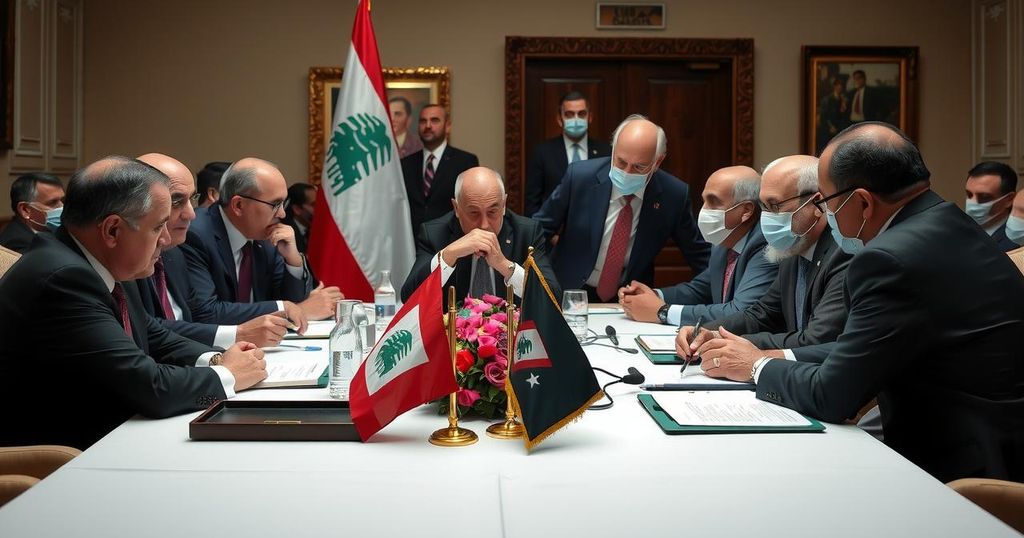Lebanon Leaders Pursue Consensus Ahead of Upcoming Presidential Vote

Lebanese leaders are in talks ahead of a parliamentary session to elect a president, amidst ongoing divisions and external pressures. Army chief Joseph Aoun is seen as the main candidate, but consensus is elusive. The country has been without a president for over two years, intensifying the existing political and economic crisis.
Lebanese political leaders engaged in discussions on Wednesday, just prior to a parliamentary session aimed at electing a new president. Despite the weakening of the Shiite Muslim group Hezbollah due to ongoing conflict, the possibility of achieving a consensus remains uncertain. For over two years, Lebanon has faced a severe economic and political crisis, still without a president, amid deep-rooted divisions between Hezbollah and rival factions.
Army chief Joseph Aoun, aged 60, is widely regarded as the leading candidate, with supporters asserting he could effectively oversee military deployments in southern Lebanon. The November 27 ceasefire negotiated with Israel stipulates Hezbollah’s withdrawal from border areas, allowing only the national army to operate there. Nonetheless, reluctance among certain factions to support Aoun complicates the 13th attempt to elect a new president since Michel Aoun’s term ended in October 2022.
The political landscape is heavily influenced by Lebanon’s historical context, especially its 1975-1990 civil war, which has left the ruling class deeply divided. International pressure has intensified following Hezbollah’s weakening, with French envoy Jean-Yves Le Drian in Lebanon urging all parties to cooperate for the presidential election. Meanwhile, US envoy Amos Hochstein advocated for the ruling class to seize the opportunity provided by the current truce to establish a political consensus.
Support for Joseph Aoun appears to be bolstered by the United States, with France and Saudi Arabia also offering some backing. As Lebanon continues to seek a president who can facilitate necessary reforms, caretaker Prime Minister Najib Mikati expressed optimism about the pending election, stating, “For the first time since the presidency became vacant, I am pleased that God willing tomorrow we will have a president.”
The process requires the president to be a Maronite Christian, traditionally supported by major Christian parties. While debates continue, factions are expected to announce their support for a candidate soon. Additional names rumored for consideration alongside Joseph Aoun include Gebran Bassil, Samir Geagea, and Jihad Azour. Critics of Hezbollah have accused the group of obstructing previous presidential elections.
Nevertheless, Hezbollah’s diminished influence exacerbated by recent military setbacks has led analysts to believe that its ability to impose a candidate has waned. In this charged atmosphere, many Lebanese citizens, such as Maysa Azzi, express hope for a new president that represents their desires rather than foreign or corrupt local agendas.
Lebanon has been mired in a profound political and economic crisis, lacking a president for over two years due to persistent sectarian divisions and conflicts between major political factions, particularly those aligned with Hezbollah and its opponents. The ongoing power struggle reflects longstanding historical tensions exacerbated by external influences and internal corruption. The country’s delicate power-sharing arrangement mandates that the president must be a Maronite Christian, which complicates the electoral process amid deep partisan divides.
As Lebanon approaches yet another critical parliamentary session to elect a president, the role of external influences, factional divides, and the ongoing political crisis are laid bare. While Joseph Aoun emerges as a potential frontrunner, the challenge remains to foster consensus across various political entities to ensure stability and begin necessary reforms to address the country’s desperate situation. The outcome of these efforts remains to be seen, reflecting the broader quest for national unity amidst challenging circumstances.
Original Source: www.barrons.com







